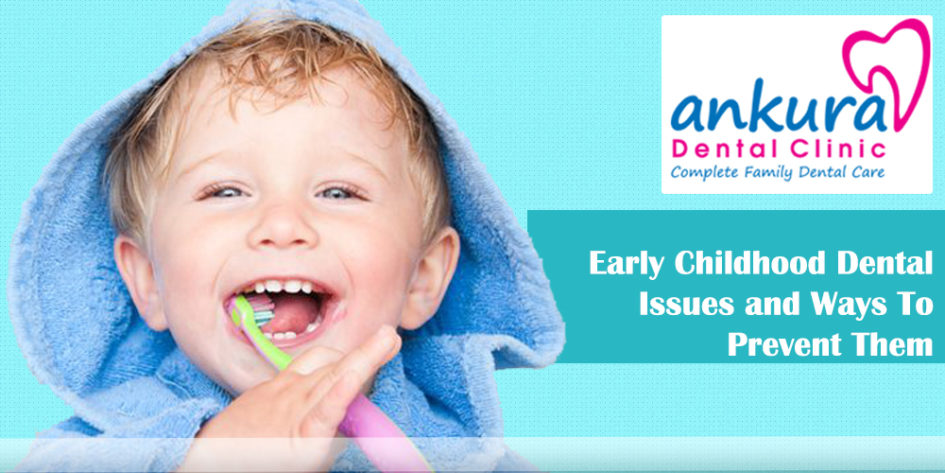Parents are surprised to learn that, a child is ready for her first dentist visit when she’s a year old, or when she has her first baby tooth. Lack of dental care or proper hygiene for your child can result in a variety of dental problems. The most common childhood dental problems observed by a dentist are as follows along with symptoms and treatments to resolve the issues.
Common Early Childhood Dental Issues
Early Childhood Caries (ECC)
Commonly referred to as baby bottle tooth decay, nursing bottle caries. Early childhood caries is caused by prolonged exposure of the teeth with sugary drinks including milk, fruit juices and infant formula. If left untreated, carious lesions can cause damage of primary teeth as well as many systemic problems.
Symptoms include:
• Brown spots on teeth
• Bad breath
• Swollen or bleeding gums
• Irritability or fever (could indicate infection)
How to avoid it?
Keep your baby’s bottle and pacifier clean and only give her sugar-free drinks. Be sure to limit sugar intake, wipe your baby’s gums with a wet cloth to clean them even before the first tooth appears, and never put your child to bed or nap with a bottle in mouth. If necessary, fill it only with water.
Treatments for ECC include fluoride treatment for minor cases and surgical removal or restoration of carious teeth for more severe cases.
Thumb Sucking
All infants tend to suck on something – fingers, pacifiers, thumbs. This is totally normal and usually you need not be concerned about anything, unless this habit is constant till the child grows up. Children tend to stop it between two and four years, when permanent front teeth start developing.
Damage Caused by Thumb Sucking
Once a child’s permanent teeth begin to grow, constantly sucking things can push your babies teeth out of arrangement, which will cause an overbite as they protrude. Thumb sucking cause improper eating in children and cause speech problems.
How to End Thumb Sucking
Once you see your child’s first tooth, it is time to encourage your child to stop sucking her thumb. Here are some helpful tips:
• Reward or praise your child for not sucking her thumb
• Thumb sucking is also a sign of anxiety and discomfort in children. Focus on the cause of the anxiety and comfort your child to ease this.
• Involve older children and include them in selecting a method of stopping
In addition to that, if you ask your pediatric dentist to offer inspiration to your child and let them educate how thumb sucking will affect teeth.
Cavities
Cavities are common and are seen frequently in children and even babies. A cavity forms in a tooth when food and mouth bacteria are not properly brushed away. Back of the mouth is a common area for cavities as it is hard to reach when brushing.
To prevent tooth decay, help children start a proper oral hygiene routine as soon as they can understand.
Remember that nutrition is a huge factor in dental health, so make sure to provide healthy, sugar-free foods.
Symptoms of Cavities
Tooth decay, which causes cavities, begins as a white, chalky spot on the teeth that will eventually become yellow, then brown, and continues to grow until it becomes a hole or cavity.
Treatment of Cavities
Once a cavity forms, take your child to the a dentist for treatment. The dentist will remove the decay from the tooth and replace it with a filling.
Having regular dental visits is key. It teaches a child importance of oral hygiene and save you money of extensive treatments.
By
Tags: Best Dental clinic, Best Dental clinic in Hyderabad, Child Dental Specialist, Child Dentistry, Child Oral Problems, Children's Dentistry, Dental Care for Kids, Kids Dental Care pediatric dentist





Leave a Reply